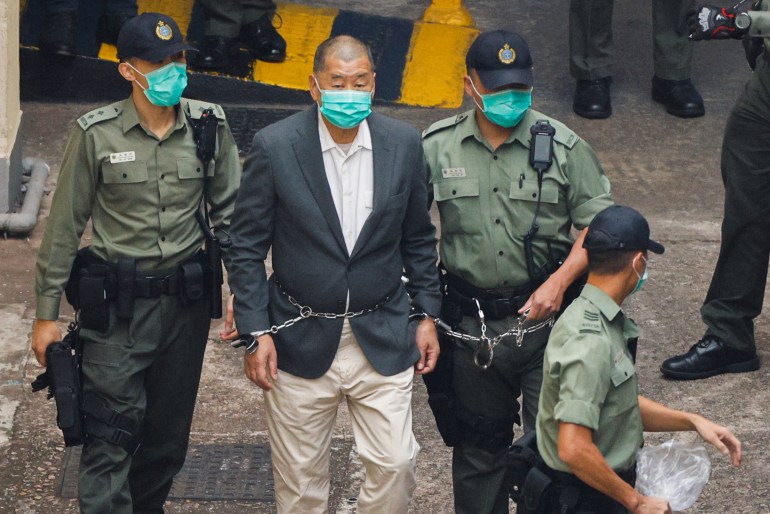Hong Kong democracy activists found guilty over Tiananmen vigil
Three, including tycoon Jimmy Lai, convicted over their part in last year’s vigil commemorating those killed in 1989.

Three prominent figures in Hong Kong’s pro-democracy movement have been found guilty for their involvement in the territory’s annual vigil to mark the Tiananmen square crackdown that left thousands of people dead.
Media tycoon Jimmy Lai and activist Chow Hang-tung, were convicted of inciting others to take part in the city’s annual Tiananmen vigil on June 4, 2020, while Gwyneth Ho was convicted of taking part in an “unauthorised” assembly. Chow was also convicted of taking part in an “unauthorised” assembly.
Keep reading
list of 4 itemsEndless pandemic? Asia’s Omicron retreat shows COVID is political
Hong Kong independence activist jailed for secession
As Beijing cracks down, Hong Kong’s media hub status in balance
Rights group Amnesty International said the convictions were an “egregious attack on the rights to freedom of expression and assembly”.
Lai, Chow and Ho all pleaded not guilty. They are all in custody having been refused bail.
“The Hong Kong government has once again flouted international law by convicting activists simply for their involvement in a peaceful, socially distanced vigil for those killed by Chinese troops on 4 June 1989,” Amnesty International’s deputy secretary general Kyle Ward said in a statement.
“The authorities have deemed the vigil ‘unlawful’ because the police did not approve it, but peaceful assembly does not need government approval. These convictions merely underline the pattern of the Hong Kong authorities’ extreme efforts to exploit the law to press multiple trumped-up charges against prominent activists.”
Like many other prominent political activists in Hong Kong, Lai, Chow and Ho are facing multiple charges – some that could bring potential life imprisonment under the National Security Law that was imposed by China in June 2020 in the wake of mass protests the year before.
“This has been a trend over the past year,” Tom Grundy, the founder of the Hong Kong Free Press told Al Jazeera. “The judge, Amanda Woodcock, ruled that Jimmy Lai did not actually have to say anything to incite (the event). The very fact that he turned up outside was a ‘deliberate act to rally support for and publicly spotlight the unauthorised assembly’.”
Lai, who turned 74 this week, founded the now-closed newspaper Apple Daily, and has been held in pre-trial detention for nearly a year.
He was arrested in August 2020 and accused of colluding with foreign forces, sedition, and fraud. In April 2021, he was sentenced to 14 months’ imprisonment for organising and joining two illegal assemblies in August 2019.


The same month, he was also charged with colluding with foreign forces and conspiracy to obstruct the course of justice. In May 2021, he was sentenced to a further 14 months’ imprisonment for organising an unauthorised assembly on October 1, 2019.
Chow Hang-tung is a former leader of the Hong Kong Alliance in Support of Patriotic Democratic Movements of China, which disbanded after authorities used the annual Tiananmen candlelight vigil it has organised for 30 years as evidence of the group “endangering national security”.
She faces a number of charges including one of “inciting subversion of state power” under the national security law. Woodcock noted that Chow had referenced the vigil on Facebook and signed off her post with ‘see you tonight’.
Gwyneth Ho, a former journalist turned activist, is one of 47 opposition politicians prosecuted earlier this year under the national security law for organising primaries to choose their own candidates for Legislative Council (Legco) elections that were later postponed. She has been in custody awaiting trial for nearly a year for “conspiring to subvert state power”.
The Legco elections are now due to take place on December 19 under new electoral rules to ensure only so-called “patriots” can hold office. Many pro-democracy legislators have gone into exile.
Crackdown on memory
The Tiananmen Square vigil had been taking place in Hong Kong’s Victoria Park since 1990, as a way to remember those who died in June 1989 when troops opened fire on students and workers who had been protesting for months in the heart of Beijing.
The vigil also urged the authorities to reveal the truth about what happened and take responsibility for what happened, amid an official attempt to stifle all discussion on the crackdown.

The vigil has been banned for the past two years, with authorities blaming the pandemic.
HKFP’s Grundy said the prosecutions was “perhaps part of a wider crackdown on the memory of the 1989 massacre” noting that textbooks had been censored, museum exhibits confiscated and the remembrance, which sometimes attracted tens of thousands of people, banned.
Under Hong Kong’s Public Order Ordinance, permission from police is required to stage an assembly or procession. Without it, the event is considered “unauthorised” and organizers and participants run the risk of a fine or jail.
Under international law, state authorities cannot require prior approval, but only notification in order to help facilitate orderly assemblies, Amnesty said.